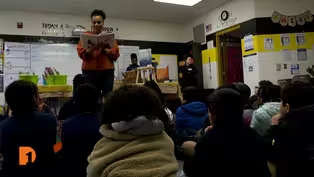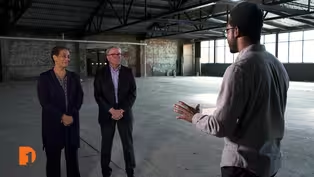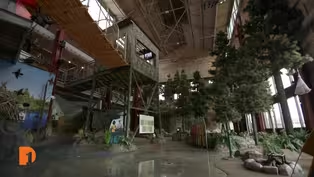
Detroit Mayor Mike Duggan delivers 2024 State of the City
Clip: Season 8 Episode 42 | 6m 58sVideo has Closed Captions
Mayor Mike Duggan talks about Detroit’s revitalization during his 2024 State of the City.
Detroit Mayor Duggan delivered his 11th State of the City address at Dexter Avenue Baptist Church on the city’s west side. He talked about the city's revitalization ahead of the 2024 NFL Draft. Contributors Stephen Henderson of “American Black Journal,” Nolan Finley of the Detroit News, and Zoe Clark from Michigan Public discuss Duggan’s speech.
Problems playing video? | Closed Captioning Feedback
Problems playing video? | Closed Captioning Feedback
One Detroit is a local public television program presented by Detroit PBS

Detroit Mayor Mike Duggan delivers 2024 State of the City
Clip: Season 8 Episode 42 | 6m 58sVideo has Closed Captions
Detroit Mayor Duggan delivered his 11th State of the City address at Dexter Avenue Baptist Church on the city’s west side. He talked about the city's revitalization ahead of the 2024 NFL Draft. Contributors Stephen Henderson of “American Black Journal,” Nolan Finley of the Detroit News, and Zoe Clark from Michigan Public discuss Duggan’s speech.
Problems playing video? | Closed Captioning Feedback
How to Watch One Detroit
One Detroit is available to stream on pbs.org and the free PBS App, available on iPhone, Apple TV, Android TV, Android smartphones, Amazon Fire TV, Amazon Fire Tablet, Roku, Samsung Smart TV, and Vizio.
Providing Support for PBS.org
Learn Moreabout PBS online sponsorship(upbeat music) - Okay, Nolan, Stephen, what's the headline from the speech?
Nolan, start with you.
- The mayor billed it as a chance to introduce Detroit to the nation through this NFL draft that's coming up next week.
That this would be a chance to show the nation how far Detroit has come over these last years of his leadership.
I think it was also though a chance to introduce Mike Duggan and his new ambitions to a bigger audience, to a Michigan audience.
I think that speech was, just as the interview we did with him a couple of weeks ago was sort of the opening salvos of his run for Governor that he very clearly has planned.
- Stephen, I wanna get to that and just sort of the political machinations that go into a speech like this.
But what was the headline for you?
- Yeah, I think it was a pretty standard State of the City, county, nation kind of speech.
You take credit for the things you think you can take credit for, you promise a couple things to get people excited.
I think the draft gave them a really wonderful peg to start talking about the things that are different than they were 11 years ago.
If you would've imagined us hosting the draft 11 years ago, how different that would've been.
I think he's got a lot to be proud of.
I give him credit also for pointing out the things that we still need to work on, the things that are not finished.
He talked a lot about neighborhoods, about housing, about policing crime.
Those things aren't solved, but he's making some progress and talking about how he's gonna make more,.
Nothing terribly surprising here.
And I agree that it is kind of that opening salvo in his case to be made to the state that he ought to get a bigger job in two years.
- And so, I mean, he focused so much on neighborhoods, neighborhood revitalization.
Does that work though in terms of if he's trying to take this message statewide or nationwide?
- I do think it does, Zoe, because I mean, that's where the problems were, and that's where he can demonstrate his ability to come up with solutions and execute them.
I mean, Detroit was headed in a very bad direction for 60 years.
And now we've gone through this decade or so of stabilization, more or less, but still not growing the way it needs to grow.
And if it's gonna grow, that's gonna come from the neighborhoods, that's where you're gonna see the population, people, families come back.
You get the neighborhoods right and everything else sort of falls into place.
- Well, that's really what his critics, I mean, for years and years have said, that it's focused too much on downtown or pro business.
And leaving out the rest of the city.
- So I mean, he had some real direct answers for that during the speech.
I mean, he said, look, if you look at the overall investment outside of downtown Detroit totals about $4 billion.
That's not a little bit.
The problem is that we have probably $20 billion worth of problems in our neighborhoods.
And as somebody who's working in the neighborhood where I was born to try to turn things around and make them better, I can attest it is really hard work.
There are so many layered problems that have existed for such a long time that even the largest investment or gesture takes some time to make a difference, and things move slowly.
That's not an excuse.
He's the mayor of the city.
He's accountable for all of the things that happen.
But I think he did a good job explaining why things aren't fixed in the neighborhoods, but that they are better.
I also think that that's a huge part of his sell to the state, and even from a cynical standpoint, most people in the state still have a really negative view of Detroit, especially historically.
They have a really negative view of Detroiters historically as somehow having ruined the state's largest city.
Part of his sell cynically is, "Hey, look, I came in here and I straightened this out.
This was a mess and I fixed it.
And I do the same for Michigan."
So I don't think it's a bad thing for him to focus on the ways in which he's done that.
I'm not saying he's doing that cynically, but I do think there is a cynical sell to be made around that.
- And Zoe, part of his message, or the big part of his message to a broader electorate, to a broader audience, is his ability to put coalitions together, to bring people together from divergent places and different philosophies to work together to solve problems.
And I just came from moderating a session with John Rakolta who headed the Growing Michigan Commission, the Governor's Commission.
He very much talked about Michigan's inability to work together, to bring groups together, as being the major impediment to the state's growth.
And so I think Duggan seized an opportunity there to tout his ability to work across lines.
And I think that's gonna be his message to Michigan voters over the next couple years.
- So the fact that he announced that they're naming this rec center, this community center over on the west side after Helen Moore, who is one of the harshest critics of every public official in the city and has been for 30 or 40 years.
I've never seen her kind of hold hands with a public official and be like, "Hey, yeah, this is great.
Things are going in the right direction."
He got her to do that by naming that center after her.
I mean, that's a masterful stroke politically.
- We'll see what the next speech is from this mayor, whether they're about Detroit or the state as a whole in terms of a possible run for Governor as Nolan was talking about.
Thanks guys.
Birdie’s Bookmobile spreads the joy of reading to Detroit children
Video has Closed Captions
Clip: S8 Ep42 | 6m 7s | Birdie’s Bookmobile, a Detroit literacy organization, spreads the joy of reading to kids. (6m 7s)
Detroit Public TV gets new name and new location in Detroit
Video has Closed Captions
Clip: S8 Ep42 | 3m 54s | Detroit Public TV rebrands to Detroit PBS and plans to move its headquarters to the city. (3m 54s)
Outdoor Adventure Center brings Michigan’s nature and recreation to Detroit
Video has Closed Captions
Clip: S8 Ep42 | 4m 48s | Outdoor Adventure Center brings Michigan’s outside in to experience nature and recreation. (4m 48s)
Providing Support for PBS.org
Learn Moreabout PBS online sponsorship
- News and Public Affairs

Top journalists deliver compelling original analysis of the hour's headlines.

- News and Public Affairs

FRONTLINE is investigative journalism that questions, explains and changes our world.












Support for PBS provided by:
One Detroit is a local public television program presented by Detroit PBS


